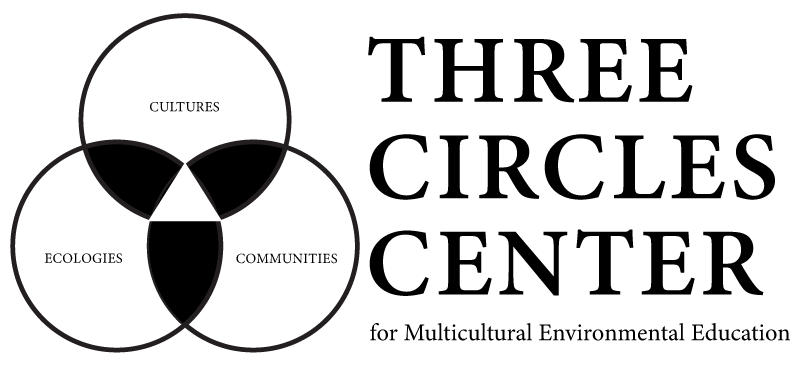The Three Circles Center Origin Story

Running Grass on Mt. Tamalpais, Marin County, 1990
In the late 1980s, Running Grass led a group of educators, cultural, and community activists in creating Three Circles Center for Multicultural Environmental Education to help shift environmental education toward broader, more authentic, and inclusive, community-based approaches to environmental learning.
Formulating Multicultural Environmental Education
While working in the San Francisco Bay Area with low-income urban and rural schools and communities in the 1980s, Three Circles found troubling contradictions between conventional environmental and outdoor education and the diverse cultural, racial, and economic backgrounds of students, their families, and communities. We discovered useful applications in the rich fields of critical theory, multicultural and ethnic education, anti-racism, and Environmental Justice in bridging and addressing those systemic inequities. The Venn diagram of our logo illustrates our framework for a Multicultural Environmental Education, one that integrates community, ecology, and culture, in their broadest senses. More specific formulations derived from this framework are embodied in the Principles of Multicultural Environmental Education. The Principles are updated and revised as our praxis and community conditions evolve.
In the 1990s Three Circles published the Journal of Culture, Ecology and Community, held workshops and training sessions, mentored university students, and influenced educational and environmental policies.

Elementary Students foraging in the Marin Headlands, Golden Gate National Recreation Area, 1987
Linking with the Environmental Justice Movement
In 1991 Running Grass joined colleagues as one of the 300 delegates to the First National People of Color Environmental Leadership Summit. The Summit launched the Environmental Justice movement onto the national stage.
The Movement clearly identified access to culturally responsive environmental education and environmental policy as issues of Environmental Justice.
Environmental Justice calls for the education of present and future generations, which emphasizes social and environmental issues based on our experience and an appreciation of our diverse cultural perspectives. (Principle #16, Principles of Environmental Justice)
In 1997 Running Grass joined the U.S. Environmental Protection Agency, Region 9, San Francisco (later Region 10, Seattle), working for 22 years on Environmental Justice issues in communities and at federal, state, and local levels of government, focusing on identifying and addressing these issues at the grassroots level.

Urban Forestry, Parker Elementary, East Oakland, 1988
Three Circles Center, Today
Initially, a nonprofit membership organization, Three Circles Center currently exists as an LLC, consulting and partnering with environmental organizations, universities, educational programs, and communities on issues of multicultural communication, staff development and diversity, curriculum, program design and evaluation, and authentic multicultural community involvement in environmental programs. Running Grass continues his Environmental Justice work by advising disproportionately-impacted communities and serving on the Washington State Environmental Justice Council.
Three Circles Center introduces, encourages, and cultivates multicultural perspectives and values in environmental learning, sustainability, and environmental protection. We work to increase access to culturally responsive environmental learning opportunities for students and communities in the interest of empowerment and environmental justice. We are dedicated to assisting environmental and outdoor educators and interpreters to teach and learn successfully in a multicultural society, based on the principles of environmental sustainability and Environmental Justice. (Three Circles Mission and Vision)
What is Multicultural Environmental Education?
Multicultural Environmental Education expands the field of environmental learning by drawing on the rich pedagogies of multicultural education and critical pedagogy, the organizing strategies of the Environmental Justice movement, and principles of community-based education. Multicultural Environmental Education seeks to ensure access to culturally responsive, school and community-based,environmental learning that incorporates the histories and aspirations of culturally and racially diverse communities. Read more.
What is Environmental Justice?
“Environmental Justice affirms the sacredness of Mother Earth, ecological unity and the interdependence of all species, and the right to be free from ecological destruction.” Principle #1, Principles of Environmental Justice The concept and the movement for Environmental Justice is central to a Multicultural Environmental Education. Principle #16 of the Principles of Environmental Justice states:
“Environmental Justice calls for the education of present and future generations which emphasizes social and environmental issues, based on our experience and an appreciation of our diverse cultural perspectives.”
In essence, this principle calls for a culturally responsive, critical environmental education that is reflective of the histories and aspirations of racially and culturally diverse communities. A Multicultural Environmental Education can draw from the rich traditions and resources of Multicultural Education, Ethnic Studies, Critical Pedagogy, Anti-racism, and other disciplines and approaches to education and community organizing. Learn more about the Principles of Environmental Justice.
